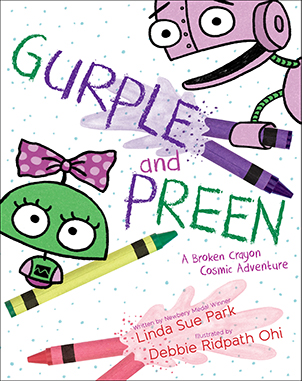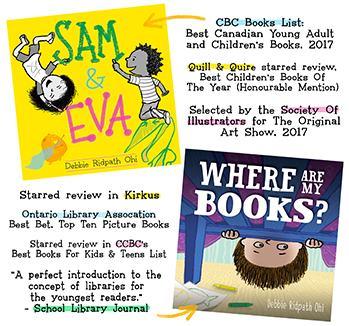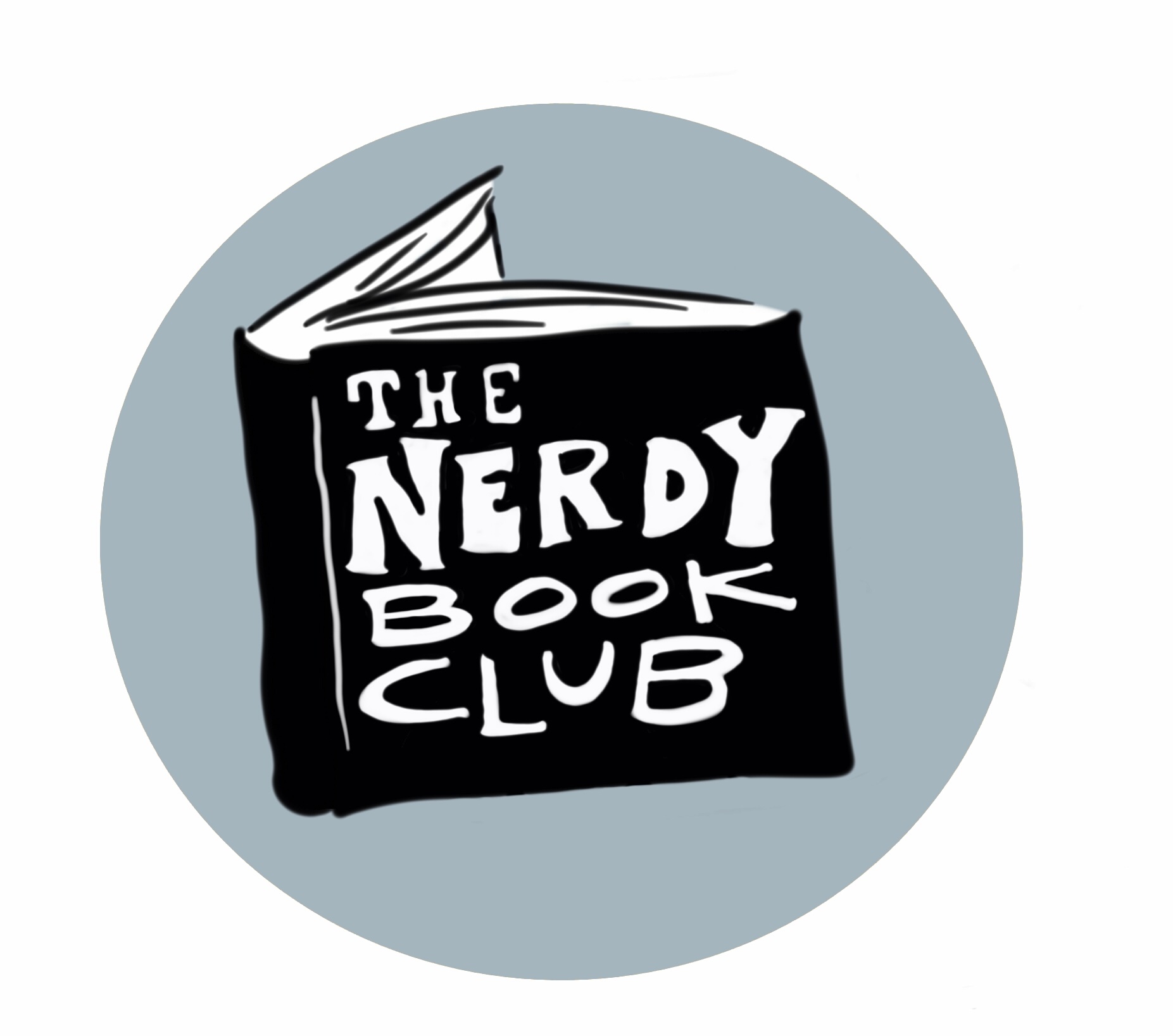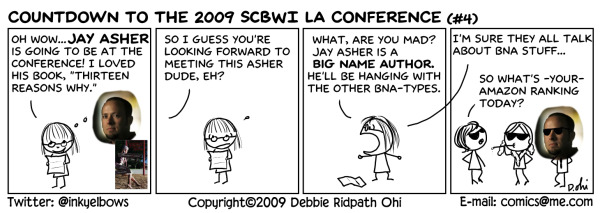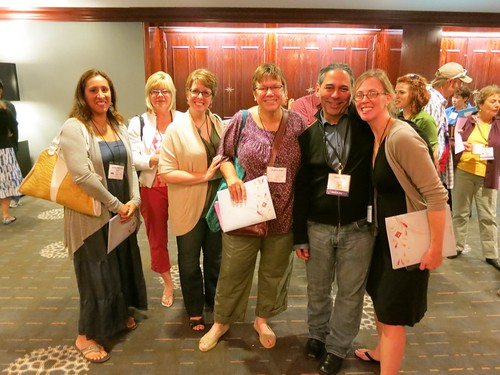Tips for SCBWI-LA conference newbies, second-timers, plus a CHALLENGE for the many-timers
(Updated version of a post I made earlier this year before the SCBWI-NYC conference)
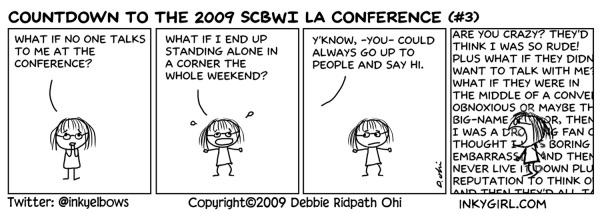
I'm leaving this week for the SCBWI Summer Conference! If you haven't yet registered, you're out of luck....the conference is sold out. However, you can follow along virtually via the #LA15SCBWI hashtag on Twitter as well as the SCBWI conference blog.
Here's my updated SCBWI Conference Advice post for first-timers (as well as a challenge for the many-timers):
If you're a conference newbie who is nervous, I encourage you to browse my SCBWI Conference Newbie comics. I created these when I was a nervous newbie as well! So many people think I'm an extrovert, but I'm actually very much an introvert and was terrified (to the point of sweating palms, pounding heart, hating the idea of having go up and introduce myself over and over) about attending my first regular SCBWI conference back in 2009.
(Edit re: above comic: I did end up meeting Jay at the conference and he was really nice! And he didn't mention his Amazon ranking EVEN ONCE! Heh.)
I've posted advice for first-timers before and will post it again at the end of this piece, but now that I've attended other SCBWI annual conferences (and had my career jumpstarted because of the 2010 SCBWI-LA Conference), here is some additional advice I have for those who have attended more than once:
Don't get offended or disheartened if people you've met before don't remember you.
This is something I've learned from both sides. As a 2nd- and 3rd-timer (and so on), I've sometimes gone up to a person or group I've met and had my confidence deflated when it becomes clear they don't remember me at ALL from the previous year. My inner reactions ranged from embarrassment, humiliation, irritation, frustration and even brief anger ("I guess I'm just NOT IMPORTANT enough for xxx to remember!! Hmph.").
Having attended many times now, I've learned the following:
- I'm terrible at remembering people unless I've had multiple conversations or interactions with the same person.
- Even then, especially if I'm tired or am in a noisy crowd (remember what I said earlier about being an introvert?) or have met many new people in a row just before, I may still forget having met someone before.
I still accidentally re-introduce myself to people whom I've met before, sometimes whom I've met EARLIER IN THE CONVENTION. I'm always horribly embarrassed when this happens.
Make sure your name badge is easily visible.
As Lee Wind points out in his helpful SCBWI blog post, having your name badge visible even at dinner or drinks afterward is an obvious visual clue to others that you're part of the tribe, and helps them remember your name as well. You can stash a few business cards in the back so they're handy.
Also, when I approach someone whom I've met before but with whom I don't have constant contact, I usually try saying something that will help remind them of our mutual context, or remind them of having met at xxx. Until I'm sure they actually do remember me, I try very hard NOT to put them on the spot (e.g. I don't say, "So, what did you think of my most recent post?" etc.).
When someone does this to me (subtly or unsubtly :-) setting the context and helping me remember), I immediately feel more at ease with them and am more likely to want to chat with them in the future.
Another tip: if someone DOES remember you, never assume that they're up-to-date on all your exciting news. I've had the occasional person react badly when they realize I'm not aware of their new book ("?? But I posted it all over Facebook!") I never assume anyone reads all my posts or keeps up with all my news. People have busy lives and different priorities.
Something else I've learned: even so-called Big Name authors, illustrators, editors, art directors and agents can be insecure. I am faaaar from being a Big Name, but having had a bit more experience at conference-going now, I also realize how some of the Big Name types who seemed standoffish to me actually weren't.
Be gracious, be forgiving and try very hard to assume the best about a person rather than the worst.
And I apologize ahead of time if I don't remember your name or re-introduce myself. :-\
And here some tips for first-timers who feel nervous about attending for the first time, or are normally very shy or introverted and dread the idea of having to meet a lot of new people:
1. Be brave and make the first move. You'd be surprised at how many other attendees feel exactly the same way as you do. Introduce yourself to people you sit beside, stand in line with, notice standing alone.
2. TAKE BUSINESS CARDS. Yes, even if you aren't published yet. We're all going to meet a lot of people over the weekend, and taking away a business card from an encounter or introduction will help the people you meet remember you. If you're an illustrator, take postcards to hand out or make sure a sample of illustration style is on your business card. When you receive a business card for someone, try to take a few moments after to write a few words to help remind you of the context.
3. Be sociable. Don't just attend the keynotes and scheduled workshops. Check out the informal activities listed in your program, like Yoga with Lori Snyder, the LGBTQ Q&A, the Illustrator Social, Nonfiction Social, International Member Social, Peer Group Critiques with Jim Averbeck, and Saturday night "Sparkle & Shine" gala. Also keep an eye on conference Twitter chat, where some meetup planning might happen ("Hey, who wants to chat? I'm in the lobby").
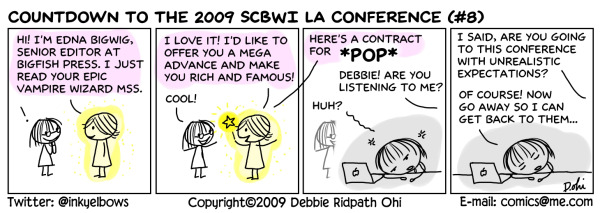
4. Have realistic expectations. Don't expect to be "discovered" at the conference. Instead, set achievable goals. These can be as specific as "I'm going to introduce myself to agent xxxx sometime during the weekend" or as vague as "I'm looking for inspiration to get back on track with my book" or even just "To try having some fun at the conference and then see what happens." I think of this type of event as an opportunity for planting seeds. There's no guaranteed outcome, but you never know what might come out of all those seeds you're planting as you meet people, attend talks, watching and listening and chatting.
My own conference seeds have blossomed, directly or indirectly, into: friendships, inspiration for new projects, invitations to speak at events, book contracts, publishing industry info that helped guide my career decisions, learning about new techniques and tools, helping others get published, and SO much more. I continue to plant seeds, because I want to keep growing as a writer and illustrator, plus I'm also well aware how quickly the industry can change.
5. In my experience, you're much more likely to meet new people if you're alone. If you're always chatting and hanging out with the same person or people, you're not as approachable. I'm not saying that you SHOULDN'T hang out with people you like, of course! Just keep in mind that as a group, you're probably not going to meet as many new people as someone who is by themselves.
6. If you're on Twitter, write your Twitter handle on your name badge somewhere.
But most of all: TRY TO HAVE FUN.
***** A CHALLENGE TO THE "MANY-TIMERS" OUT THERE ****
Try to remember what it was like when you attended your very first event, or how insecure you felt in the beginning. Then make it a personal challenge to find at least one lost-looking or nervous conference newbie who is sitting or standing alone. Introduce yourself, chat with them, find out what they're working on, perhaps (if appropriate) offer some advice.
Give good karma and it WILL come back to you.
RELATED POSTS AND RESOURCES:
Are You Entering The SCBWI-LA Illustration Portfolio Showcase? Here Are Tips For Before And During The Conference: my post on KidLitArtists.com last month
On SCBWI, Advice For Authors and Illustrators: from art director, Giuseppe Castellano.
Your Conference THRIVE-al Guide: A Dozen Tips For Four Days Made Of Awesome: by Lee Wind, on the SCBWI blog.
Tips For Attending A Writing Conference: from YA writer, Valerie Lawson.
SCBWI Conference Tips For Newbies: from children's book illustrator, Heather Powers
Surviving Your First SCBWI Conference - by A.J. Cosmo
Tips For First-Time Conference-Goers: Children's Writers Edition: from McIntosh and Otis agent, Christa Heschke.
 Debbie Ridpath Ohi tagged
Debbie Ridpath Ohi tagged  conferences,
conferences,  scbwi,
scbwi,  scbwi-la in
scbwi-la in  Comics for writers,
Comics for writers,  Conference/Event Reports
Conference/Event Reports 




